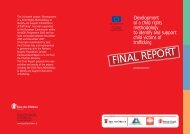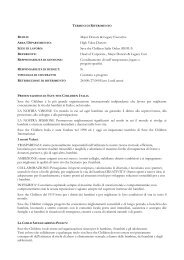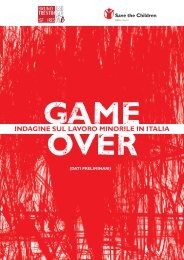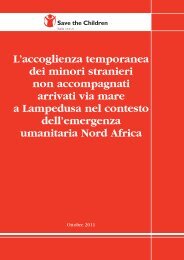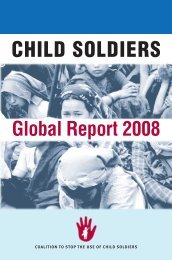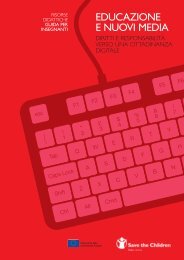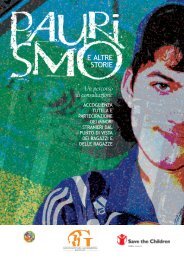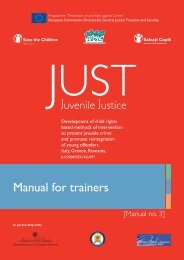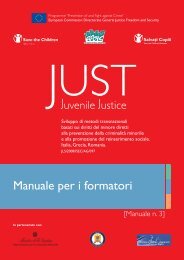EUROPEAN STUDENT FORUM - Save the Children Italia Onlus
EUROPEAN STUDENT FORUM - Save the Children Italia Onlus
EUROPEAN STUDENT FORUM - Save the Children Italia Onlus
You also want an ePaper? Increase the reach of your titles
YUMPU automatically turns print PDFs into web optimized ePapers that Google loves.
F O RUM<strong>EUROPEAN</strong><strong>STUDENT</strong> <strong>FORUM</strong>on <strong>the</strong> MillenniumDevelopment GoalsCON ILCONTRIBUTODELLA COMMISSIONEEUROPEA
<strong>Save</strong> <strong>the</strong> <strong>Children</strong> dal 1919 lotta per i diritti dei bambinie per migliorare le loro condizioni di vita in tutto il mondoEuropean Student Forumon <strong>the</strong> Millennium Development GoalsProject idea by Ines BiemmiEdited byChiara Paganuzzi and Isabella TentiTexts byCarlotta Bellomi, Chiara Paganuzziand Isabella TentiAcknowledgementsWe would like to thank <strong>the</strong> boys and <strong>the</strong> girls whoparticipated in <strong>the</strong> Forum, <strong>the</strong> <strong>Italia</strong>n, Spanish andLatvian institutions for <strong>the</strong>ir support during <strong>the</strong> allactivity, <strong>the</strong> project partners such as <strong>Save</strong> <strong>the</strong><strong>Children</strong> Spain and <strong>the</strong> Latvian Adult EducationAssociation and all <strong>the</strong> persons that have directlyand indirectly made <strong>the</strong> Forum possible, inparticular: Ines Biemmi, Francesca Bilotta, ElisabettaLeonardi, Elena Scanu Ballona, Nicola Scognamiglioand <strong>the</strong> trainers of <strong>Save</strong> <strong>the</strong> <strong>Children</strong> Italy.Design and layoutAC & P | Aurelio Candido & Partners - RomePhotosForum General AssemblyCity Council of Milan, 7 May 2010Published by<strong>Save</strong> <strong>the</strong> <strong>Children</strong> <strong>Italia</strong>Via Volturno 5800185 RomeItalyFirst Edition 2010© <strong>Save</strong> <strong>the</strong> <strong>Children</strong> <strong>Italia</strong> <strong>Onlus</strong>Printed byEdithink Srl - Roma
F O RUM<strong>EUROPEAN</strong><strong>STUDENT</strong> <strong>FORUM</strong>on <strong>the</strong> MillenniumDevelopment GoalsA cura diChiara Paganuzzi e Isabella Tenti
Introduction 7The voice of <strong>the</strong> institution representatives 8Child conditions in <strong>the</strong> perspective of achieving<strong>the</strong> Millennium Development Goals 10European Student Forum on <strong>the</strong> MillenniumDevelopment Goals 12Classes, subjects, paths, motions 15IndiceII edition – Academic year 2009-2010 15I edition – Academic year 2007 -2008 22The students’ voice 28Child friendly version of <strong>the</strong> CRC 305
F O RUM <strong>EUROPEAN</strong><strong>STUDENT</strong> <strong>FORUM</strong>IntroductionIThe European Student Forum on <strong>the</strong> MillenniumDevelopment Goals was <strong>the</strong> concluding event of <strong>the</strong>three-year project “Development Education and <strong>the</strong>Millennium Development Goals: knowledge, methodologiesand ICTs” (2007-2010). This project was co-funded by <strong>the</strong>European Commission and aimed at promoting educationalactivities on <strong>Children</strong> Rights, on <strong>the</strong> Millennium DevelopmentGoals and on a critical and aware use of new technologies.Its main objective was, particularly, to foster <strong>the</strong> involvement ofEuropean students (<strong>Italia</strong>n, Latvian and Spanish) in researchand study activities based on democratic participation models.Today’s schools cannot survive without <strong>the</strong> active participationand proposals of all those who are part of <strong>the</strong>m, particularly<strong>the</strong> students. For <strong>Save</strong> <strong>the</strong> <strong>Children</strong> it is essential that children,like all o<strong>the</strong>r human beings, have <strong>the</strong> chance to make <strong>the</strong>irvoice heard and are taken into consideration when it comesto issues that influence <strong>the</strong>ir life or that of <strong>the</strong>ir peers.Involving girls and boys in educational and awareness activitieson <strong>the</strong> Millennium Development Goals means contributing toa real understanding of <strong>the</strong> causes that condemn threequarters of our planet to poverty and hunger. It means laying<strong>the</strong> groundwork for a possiblechange that can lead to overcomingeconomic and social inequalitybetween populations.I would like to thank <strong>the</strong> girls andboys, who have been <strong>the</strong> protagonists of this participatoryexperience, <strong>the</strong> workers and educators of <strong>Save</strong> <strong>the</strong> <strong>Children</strong>Italy, <strong>Save</strong> <strong>the</strong> <strong>Children</strong> Spain and <strong>the</strong> Latvian Adult EducationAssociation (LAEA), who have contributed to <strong>the</strong> success ofthis event, and <strong>the</strong> representatives of <strong>the</strong> institutions, who havesupported and fostered dialogue with our students, <strong>the</strong> realdriving force of <strong>the</strong> change we hope for.Valerio NeriGeneral Director<strong>Save</strong> <strong>the</strong> <strong>Children</strong> Italy
F O RUM <strong>EUROPEAN</strong><strong>STUDENT</strong> <strong>FORUM</strong>The voiceof <strong>the</strong> institutionrepresentativesITALYThe “European Student Forum on <strong>the</strong> MillenniumDevelopment Goals” project has given <strong>the</strong> opportunityto hundreds of students from our Province, from Spainand Latvia to analyse issues related to children rights in<strong>the</strong> light of <strong>the</strong> Millennium Development Goals and tolearn and understand what has been done so far locally,nationally and internationally. Such an analysis aimed atidentifying which battles still have to be fought to fullyachieve <strong>the</strong> rights sanctioned by <strong>the</strong> Convention on <strong>the</strong>Rights of <strong>the</strong> Child and <strong>the</strong> Millennium DevelopmentGoals.The project came to an end with a big Assembly at <strong>the</strong>Milan City Council Hall, on 7th May 2010. The rights<strong>the</strong>se girls and boys talked about are, first and foremost,<strong>the</strong>ir rights: for this reason it was right to listen to <strong>the</strong>m,giving <strong>the</strong>m our attention and consideration. We areaware that knowing and pursuing one’s rights is <strong>the</strong> firststep to developing, particularly in young people, anawareness of everybody’s rights. We are certain that if<strong>the</strong>se rights were applied in practice, apart from beingconsidered as principles, <strong>the</strong>y would help us to live in amuch fairer world.The message <strong>the</strong>se students are sending us is, after all,quite simple: life would be better in a fair world basedon respect. So, to achieve respect for <strong>the</strong>se principles,we have to take all <strong>the</strong> necessary actions to unravel <strong>the</strong>schemes of abuse and violence that constitute <strong>the</strong>jungle of neglected rights. Members of governmentelective assemblies have to do this through legislation;those presiding over local administrations can do it bydeveloping real practices that encourage and stimulatepromotion of everyone’s rights; people in society canand should do this through coherent and responsiblebehaviour.I would like to thank <strong>Save</strong> <strong>the</strong> <strong>Children</strong> that was animportant partner in promoting and supporting thisproject and that wanted to realize this usefulpublication. But a special thanks goes to <strong>the</strong> girls andboys who were <strong>the</strong> protagonists of this challenge, whichI hope will also be an incentive for new challenges andnew projects in <strong>the</strong> future.Marina Lazzati,Councillor for EducationMilan Provincial Council8
F O RUM <strong>EUROPEAN</strong><strong>STUDENT</strong> <strong>FORUM</strong>Child conditionsin <strong>the</strong> perspectiveof achieving<strong>the</strong> MillenniumDevelopmentGoalsFor <strong>Save</strong> <strong>the</strong> <strong>Children</strong> it is fundamental that <strong>the</strong>assertion of children rights go hand in hand with asubstantial change in <strong>the</strong> current development modeland in <strong>the</strong> relationships between <strong>the</strong> North and <strong>the</strong>South of <strong>the</strong> world. To exert a real change <strong>the</strong>re has tobe economic investment in education, in health and inguaranteeing <strong>the</strong> application of human rights,particularly child rights. Therefore, respecting such anapproach, <strong>Save</strong> <strong>the</strong> <strong>Children</strong>, through <strong>the</strong> activityinitiated by <strong>the</strong> Forum on <strong>the</strong> Millennium DevelopmentGoals (MDGs), wants to guarantee <strong>the</strong> right of childrento express <strong>the</strong>ir own opinions and to be taken intoserious consideration by <strong>the</strong> authorities in matters thatregard <strong>the</strong>m directly.The approach to rights adopted by <strong>Save</strong> <strong>the</strong> <strong>Children</strong>acknowledges children as active subjects of <strong>the</strong>ir owndevelopment, ra<strong>the</strong>r that passive receivers of goods andservices. Therefore, participation in <strong>the</strong> developmentprocess should be considered as both <strong>the</strong> end and <strong>the</strong>means of development programmes. The MillenniumDevelopment Goals can be used as a starting pointwhereby students promote awareness raising andeducation actions at school among <strong>the</strong>ir peers, to draw<strong>the</strong>m closer to development issues.There is a strong interrelation between child rights and<strong>the</strong> Millennium Development Goals. The firstparallelism lies in <strong>the</strong> fact that both <strong>the</strong> MillenniumDeclaration - from which <strong>the</strong> Millennium DevelopmentGoals are derived - and <strong>the</strong> UN Convention on <strong>the</strong>Rights of <strong>the</strong> Child are based on interconnectedprinciples. The fundamental principles behind <strong>the</strong> UNConvention on <strong>the</strong> Rights of <strong>the</strong> Child (CRC) are nondiscrimination,best interests, life and development andparticipation, while those behind <strong>the</strong> MillenniumDeclaration are freedom, equality, solidarity, sharedresponsibility, tolerance and respect for <strong>the</strong>environment. Ano<strong>the</strong>r connection can be found in <strong>the</strong>precise references that <strong>the</strong>re are between eachMillennium Development Goal and some articles of <strong>the</strong>UN Convention on <strong>the</strong> Rights of <strong>the</strong> Child. Particularly,in relation to each single Millennium DevelopmentGoal, we can note <strong>the</strong> following:GOAL 1Eradicate extreme poverty and hungerArticle 6 of <strong>the</strong> CRC stipulates that every child has <strong>the</strong>right to an adequate standard of living with adequatefood, clothing, shelter, social services, etc. and thatevery State is obliged to ensure that children surviveand develop healthily.It is, <strong>the</strong>refore, necessary to adopt a social developmentapproach that favours those living below <strong>the</strong> povertyline and focused on children, invest in basic services,establish social protection mechanisms for <strong>the</strong> poorestand, finally, promote food security to avoidnourishment crisis.GOAL 2Achieve universal primary educationArticle 28 of <strong>the</strong> CRC sanctions <strong>the</strong> right of every childto education. Education is a fundamental right whichpromotes social development and is <strong>the</strong> most effectiveway to defeat poverty. For this reason it is important toguarantee adequate funds for education, increase accessto good quality education, include education inhumanitarian interventions in cases of humanitarianemergencies. Moreover, pressure has to be made toremove <strong>the</strong> conditions imposed on Countries byinternational financial institutions, because <strong>the</strong>se have anegative impact on <strong>the</strong> quality of education.GOAL 3Promote gender equality and empowerwomenArticle 2 of <strong>the</strong> CRC affirms <strong>the</strong> principle of nondiscrimination,while article 28 sanctions <strong>the</strong> right toeducation. The reasons why girls have more difficultiesin attending school are mainly two: poverty anddiscrimination. It is necessary to foster gender equalityat school and support a flexible form of schooling for<strong>the</strong> girls, so that gender inequality in all schools in <strong>the</strong>10
F O RUM <strong>EUROPEAN</strong><strong>STUDENT</strong> <strong>FORUM</strong>European StudentForum on<strong>the</strong> MillenniumDevelopmentGoals<strong>Children</strong>’s participation is one of <strong>the</strong> founding valuesof <strong>Save</strong> <strong>the</strong> <strong>Children</strong>’s work and mission. Theorganization is engaged, in Italy and <strong>the</strong> world, inmaking sure that children can have <strong>the</strong>ir rights fullyrespected through participation programmes.In order to facilitate balanced development, welfareand learning, it is essential for <strong>Save</strong> <strong>the</strong> <strong>Children</strong> togive young people <strong>the</strong> opportunity to participate indecision-making, allow <strong>the</strong>m to express <strong>the</strong>ir ownideas and points of view and seriously take intoconsideration what <strong>the</strong>y say, depending on <strong>the</strong>ir ageand maturity.The European Student Forum on <strong>the</strong> MillenniumDevelopment Goals involved secondary school studentsfrom three European countries, Italy, Latvia and Spain inan activity aimed at deepening <strong>the</strong> knowledge of <strong>the</strong> UNConvention on <strong>the</strong> Rights of <strong>the</strong> Child and <strong>the</strong>Millennium Development Goals. <strong>Save</strong> <strong>the</strong> <strong>Children</strong> Italy,in partnership with <strong>Save</strong> <strong>the</strong> <strong>Children</strong> Spain and <strong>the</strong>Latvian Adult Education Association (LAEA), realized aprogramme that favoured <strong>the</strong> exercise of activecitizenship by students from <strong>the</strong> three countriesinvolved.“The UN Convention on <strong>the</strong> Rightsof <strong>the</strong> Child (CRC) and <strong>the</strong> rightto participation”<strong>Children</strong>’s participation is a fundamentalhuman right. On 20 November 1989, <strong>the</strong>United Nations General Assemblyunanimously approved <strong>the</strong> Convention on<strong>the</strong> Rights of <strong>the</strong> Child (CRC).The four core principles underlying <strong>the</strong> CRCand forming an integral part of <strong>the</strong> 54 articlesof <strong>the</strong> Convention, are:Article 2: Non discriminationArticle 3: Best interestsArticle 6: Life, survival and developmentArticle 12: ParticipationThe UN Convention on <strong>the</strong> Rights of <strong>the</strong>Child attributes great importance to <strong>the</strong>participation of children and declares <strong>the</strong>principle in a number of articles (12, 13, 14,15).Article 121. States Parties shall assure to <strong>the</strong> child who iscapable of forming his or her own views <strong>the</strong>right to express those views freely in allmatters affecting <strong>the</strong> child, <strong>the</strong> views of <strong>the</strong>child being given due weight in accordancewith <strong>the</strong> age and maturity of <strong>the</strong> child.2. For this purpose, <strong>the</strong> child shall in particularbe provided <strong>the</strong> opportunity to be heard inany judicial and administrative proceedingsaffecting <strong>the</strong> child, ei<strong>the</strong>r directly, or through arepresentative or an appropriate body, in amanner consistent with <strong>the</strong> procedural rulesof national law.Article 131. The child shall have <strong>the</strong> right to freedomof expression. this right shall includefreedom to seek, receive and impartinformation and ideas of all kinds,regardless of frontiers, ei<strong>the</strong>r orally, inwriting or in print, in <strong>the</strong> form of art, orthrough any o<strong>the</strong>r media of <strong>the</strong> child’schoice.2. The exercise of this right may be subject tocertain restrictions, but <strong>the</strong>se shall only besuch as are provided by law and arenecessary: (a) For respect of <strong>the</strong> rights orreputations of o<strong>the</strong>rs; or (b) For <strong>the</strong>protection of national security or of publicorder (ordre public), or of public health ormorals.Article 141. States Parties shall respect <strong>the</strong> right of <strong>the</strong>child to freedom of thought, conscience andreligion.2. States Parties shall respect <strong>the</strong> rights andduties of <strong>the</strong> parents and, when applicable,legal guardians, to provide direction to <strong>the</strong>child in <strong>the</strong> exercise of his or her right in amanner consistent with <strong>the</strong> evolvingcapacities of <strong>the</strong> child.3. Freedom to manifest one’s religion or beliefsmay be subject only to such limitations asare prescribed by law and are necessary toprotect public safety, order, health or morals,or <strong>the</strong> fundamental rights and freedoms ofo<strong>the</strong>rs.Article 151. States Parties recognize <strong>the</strong> rights of <strong>the</strong>child to freedom of association and tofreedom of peaceful assembly.2. No restrictions may be placed on <strong>the</strong>exercise of <strong>the</strong>se rights o<strong>the</strong>r than thoseimposed inconformity with <strong>the</strong> law and12
F O RUM <strong>EUROPEAN</strong><strong>STUDENT</strong> <strong>FORUM</strong>which are necessary in a democratic societyin <strong>the</strong> interests of national security or publicsafety, public order (ordre public), <strong>the</strong>protection of public health or morals or <strong>the</strong>protection of <strong>the</strong> rights and freedoms ofo<strong>the</strong>rs.In <strong>the</strong> Convention on <strong>the</strong> Rights of <strong>the</strong> Childparticipation is realized also through <strong>the</strong>exercise of <strong>the</strong> following rights:Article 161. No child shall be subjected to arbitrary orunlawful interference with his or her privacy,family, home or correspondence, nor tounlawful attacks on his or her honour orreputation.2. The child has <strong>the</strong> right to <strong>the</strong> protection of<strong>the</strong> law against such interference or attacks.Article 17States Parties recognize <strong>the</strong> importantfunction performed by <strong>the</strong> mass media andshall ensure that <strong>the</strong> child has access toinformation and material from a diversity ofnational and international sources, especiallythose aimed at <strong>the</strong> promotion of his or hersocial, spiritual and moral well-being andphysical and mental health. To this end, StatesParties shall:a)Encourage <strong>the</strong> mass media to disseminateinformation and material of social andcultural benefit to <strong>the</strong> child and inaccordance with <strong>the</strong> spirit of article 29;b)Encourage international co-operation in <strong>the</strong>production, exchange and dissemination ofsuch information and material from adiversity of cultural, national andinternational sources;c)Encourage <strong>the</strong> production anddissemination of children’s books;d)Encourage <strong>the</strong> mass media to haveparticular regard to <strong>the</strong> linguistic needs of<strong>the</strong> child who belongs to a minority groupor who is indigenous;e)Encourage <strong>the</strong> development of appropriateguidelines for <strong>the</strong> protection of <strong>the</strong> childfrom information and material injurious tohis or her well-being, bearing in mind <strong>the</strong>provisions of articles 13 and 18.Article 311. States Parties recognize <strong>the</strong> right of <strong>the</strong>child to rest and leisure, to engage in playand recreational activities appropriate to <strong>the</strong>age of <strong>the</strong> child and to participate freely incultural life and <strong>the</strong> arts.1. States Parties shall respect and promote <strong>the</strong>right of <strong>the</strong> child to participate fully incultural and artistic life and shall encourage<strong>the</strong> provision of appropriate and equalopportunities for cultural, artistic,recreational and leisure activity.At school, toge<strong>the</strong>r with <strong>the</strong>ir teachers and <strong>the</strong>educators from <strong>the</strong> three partner organizations, <strong>the</strong>students tackled a significant problem inherent in <strong>the</strong>rights of <strong>the</strong> child and <strong>the</strong> Millennium DevelopmentGoals. They ga<strong>the</strong>red information, analysed <strong>the</strong>se issuesin order to identify and propose ideas and solutions topresent and share with <strong>the</strong> duty bearers 2 on <strong>the</strong> finalday of <strong>the</strong> project. The European Forum ended with aGeneral Assembly, that is, an event where studentspresented <strong>the</strong> proposals, elaborated during <strong>the</strong>programme, to <strong>the</strong> political representatives and moregenerally to <strong>the</strong> duty bearers <strong>the</strong>y had identified during<strong>the</strong> class activities. All <strong>the</strong> students took part in <strong>the</strong>programme that led to <strong>the</strong> General Assembly. It was nota Forum of representatives, but ra<strong>the</strong>r an event thatencouraged <strong>the</strong> active participation of each and everystudent.The European Student Forum on <strong>the</strong> MillenniumDevelopment Goals was held in two editions: <strong>the</strong> firstone during <strong>the</strong> scholastic year 2007-2008, <strong>the</strong> secondduring <strong>the</strong> scholastic year 2009-2010.In each edition <strong>the</strong> Forum programme included:1. A meeting for initial planning, during after-schoolhours, with <strong>the</strong> teachers, <strong>the</strong> student representativesof <strong>the</strong> participating classes and <strong>the</strong> staff of <strong>Save</strong> <strong>the</strong><strong>Children</strong> Italy, <strong>Save</strong> <strong>the</strong> <strong>Children</strong> Spain and <strong>the</strong>Latvian Adult Education Association. This firstmeeting served to contact <strong>the</strong> teachers and <strong>the</strong>students, explain <strong>the</strong> Forum programme to <strong>the</strong>m andinvolve <strong>the</strong>m in <strong>the</strong> organization of <strong>the</strong> activity rightfrom <strong>the</strong> beginning.2. Four 2-hour meetings in every class with <strong>the</strong>educators from <strong>the</strong> partner organizations (<strong>Save</strong> <strong>the</strong><strong>Children</strong> Italy, <strong>Save</strong> <strong>the</strong> <strong>Children</strong> Spain, Adult LatvianEducation Association). These meetings were dividedinto two phases: <strong>the</strong> first two aimed at setting <strong>the</strong>general <strong>the</strong>mes related to <strong>the</strong> UN Convention on <strong>the</strong>Rights of <strong>the</strong> Child and <strong>the</strong> Millennium DevelopmentGoals. During <strong>the</strong> o<strong>the</strong>r two meetings <strong>the</strong>y enteredinto <strong>the</strong> merits of a problem or of a particular aspectchosen by <strong>the</strong> class. The educational project wasincluded in <strong>the</strong> class teaching programme by <strong>the</strong>teachers who were guiding <strong>the</strong> students in <strong>the</strong>irresearch and analysis of <strong>the</strong> problem, chosen by <strong>the</strong>participating classes.3. A meeting for a halfway assessment, during afterschoolhours, with <strong>the</strong> referring teachers, <strong>the</strong> classrepresentatives and <strong>the</strong> educators from <strong>the</strong> involvedorganizations. This meeting aimed at gauging <strong>the</strong>approval of <strong>the</strong> activity and at making students andteachers more aware of <strong>the</strong> organization of <strong>the</strong> finalday and more responsible for it.2Those responsiblefor implementing orviolating a right.13
F O RUM <strong>EUROPEAN</strong><strong>STUDENT</strong> <strong>FORUM</strong>4. Three 2-hour meetings with <strong>the</strong> educators. In thisseries of meetings each class was prepared for <strong>the</strong>final day of <strong>the</strong> Forum. During <strong>the</strong>se meetings <strong>the</strong>students drew up some requests which were <strong>the</strong>nread out in <strong>the</strong> form of motions andrecommendations at <strong>the</strong> General Assembly. They alsoprepared some s which illustrated <strong>the</strong> work done andshared with <strong>the</strong> students from <strong>the</strong> o<strong>the</strong>r classes andwith <strong>the</strong> duty bearers during <strong>the</strong> General Assembly.5. A final day for <strong>the</strong> Forum General Assembly. On <strong>the</strong>final day of <strong>the</strong> Forum, all <strong>the</strong> classes met in a GeneralAssembly where <strong>the</strong> students presented <strong>the</strong>ir work, <strong>the</strong>s and <strong>the</strong> motions, to <strong>the</strong> relevant duty bearers (localadministrators, schools, NGOs, mass media, etc.). Theprotagonists on this day were solely <strong>the</strong> students. TheAssembly was supported by staff from <strong>the</strong> partnerorganizations, who had to make sure that <strong>the</strong> meetingproceeded according to <strong>the</strong> rules establishedbeforehand and approved by <strong>the</strong> students. Theparticipating classes discussed, shared and approvedproposals to solve or alleviate <strong>the</strong> tackled problem.Adults and institutions, to whom <strong>the</strong> requests by <strong>the</strong>classes were addressed, were present at <strong>the</strong> Assembly,but <strong>the</strong>y could only take <strong>the</strong> floor to answer <strong>the</strong>students and to express <strong>the</strong>ir view regarding <strong>the</strong>motions addressed to <strong>the</strong>m. The adults should takeinto account <strong>the</strong> approved documents in <strong>the</strong> future.6. A meeting for a final assessment, during after-schoolhours, with <strong>the</strong> school teachers, <strong>the</strong> classrepresentatives and <strong>Save</strong> <strong>the</strong> <strong>Children</strong> <strong>Italia</strong>, <strong>Save</strong> <strong>the</strong><strong>Children</strong> Spain and <strong>the</strong> Latvian Adult EducationAssociation. This appointment, organized to discuss<strong>the</strong> students’ and <strong>the</strong> teachers’ assessments on <strong>the</strong>activity, is an important goal, because <strong>the</strong>presentation of <strong>the</strong> motions requires a response from<strong>the</strong> duty bearers and a future possibility of concretelyfulfilling <strong>the</strong> requests. In this ensuing phase it isimportant to keep in contact so that <strong>the</strong> forum is nottransformed into a mere performance by <strong>the</strong>students, but in a demand for democracy and rightsfor which <strong>the</strong> students expect concrete results.The whole Forum programme serves to create apositive relationship between adolescents and adults.The more young people’s participation, awareness andself-protection increase, <strong>the</strong> more adults have to feelresponsible for promoting children rights. On <strong>the</strong> o<strong>the</strong>rhand, more participation by young people will helpadults in <strong>the</strong>ir responsibility to defend <strong>the</strong>ir rights.Claiming one’s rights and participating in <strong>the</strong>foreground helps young people grow up and leads<strong>the</strong>m more easily to becoming active members insociety and to taking up <strong>the</strong>ir social roles responsibly.<strong>FORUM</strong> EDUCATIONAL PROGRAMME7 TWO-HOUR TRAINING SESSIONS IN EACH CLASS + 1 FIVE HOUR GENERAL ASSEMBLYCONTENTS AND ELABORATIONPREPARATION OF MOTIONS AND MESSAGES12 3 4 5 6 7 <strong>FORUM</strong>PLANNING(FORMATORI, DOCENTI, RAPPRESENTANTI DEGLI <strong>STUDENT</strong>I)HALFWAYASSESSMENTGENERALASSEMBLYFINALASSESSMENTMONITORAGGIO14
ITALY - SPAIN - LATVIAACADEMIC YEAR 2009/2010Classes, subjects,33paths, motionsItalYCLASSE II GITSOS ALBE STEINER SCHOOLConsidering <strong>the</strong> strong interconnection thatcharacterizes <strong>the</strong> eight Millennium Development Goals,<strong>the</strong> students of Class IIG of ITSOS Albe Steiner Schoolchose to fur<strong>the</strong>r <strong>the</strong>ir study of <strong>the</strong> Forum topicsthrough an integrated and broad perspective.A participatory approach was adopted for <strong>the</strong> indepthstudy of <strong>the</strong> Convention on <strong>the</strong> Rights of <strong>the</strong>Child (UNCRC) and <strong>the</strong> Millennium DevelopmentGoals. The proposal, chosen and shared by <strong>the</strong> wholeclass as early as <strong>the</strong> second meeting, encouraged <strong>the</strong>students to reflect on <strong>the</strong> close and remoteconsequences of <strong>the</strong> analysed policies and to identify<strong>the</strong> main <strong>the</strong>mes <strong>the</strong>y wanted to transmit to <strong>the</strong>irpeers.In clear and direct language, <strong>the</strong> motion aims at makingyoung people aware of <strong>the</strong> Convention on <strong>the</strong> Rights of<strong>the</strong> Child and of <strong>the</strong> Millennium Development Goals.For this purpose <strong>the</strong> girls and boys composed a rapsong. The aim was to use <strong>the</strong> song as an effectivecommunicative tool to attract adolescents to <strong>the</strong>contents of <strong>the</strong> European Forum.MOTIONTHE <strong>STUDENT</strong>S OF CLASS IIG OF ITSOS ALBESTEINER SCHOOL OF MILANafter an in-depth study of <strong>the</strong> eight MillenniumDevelopment Goals andCONSIDERING• <strong>the</strong> right to education (art. 28);• <strong>the</strong> right to life, survival and development (art. 6);• <strong>the</strong> right to be protected against all forms ofdiscrimination (art. 2);• <strong>the</strong> right to health care (art. 24);• <strong>the</strong> right to have <strong>the</strong> rights in <strong>the</strong> Conventionimplemented by public institutions (art. 4);RECOMMENDto promote awareness of <strong>the</strong> Millennium DevelopmentGoals and of <strong>the</strong> rights in <strong>the</strong> CRC among girls and boysthrough <strong>the</strong> use of simple and clear language capable ofeffectively reaching young people. For this purpose <strong>the</strong>students of <strong>the</strong> class are writing a rap song andASK1. <strong>Save</strong> <strong>the</strong> <strong>Children</strong> to organize information activitiesin schools on children’s and adolescents’ rights andon <strong>the</strong> Millennium Development Goals;2. <strong>the</strong> Headmaster of “Albe Steiner” School to organizetwo meetings (one for first and second year studentsand one for <strong>the</strong> third, fourth and fifth year students)where Class II G can present <strong>the</strong>ir work and <strong>the</strong> rapsong;3. <strong>the</strong> Provincial School Authority of Milan to act as amouthpiece of <strong>the</strong> Millennium Development Goalsamong <strong>the</strong> secondary school students of Milan bysending a circular, and to publicize <strong>the</strong> rap song;4. Radio 105 and Radio Popolare to broadcast <strong>the</strong> songabout <strong>the</strong> Millenium Development Goals;5. The Coordination of <strong>the</strong> Student Movements topresent <strong>the</strong> work done and <strong>the</strong> rap song in ameeting;6. all <strong>the</strong> above-mentioned to promote <strong>the</strong> song on <strong>the</strong>Millennium Development Goals through <strong>the</strong>irwebsites and o<strong>the</strong>r innovative and effective channels.Milan, May 7 th 2010CLASS II ASADELAIDE CAIROLI SCHOOLfF oO rum RUMeuropeanstudent forum<strong>the</strong> importance of dealing with all <strong>the</strong> eight MillenniumDevelopment Goals as a whole, being so strictlyinterconnected to one ano<strong>the</strong>r,AWAREof <strong>the</strong> fact that <strong>the</strong> Millennium Development Goals, <strong>the</strong>issues related to <strong>the</strong>m and <strong>the</strong> commitment undertakenby <strong>the</strong> national governments are not well known amonggirls and boys,would like to focus on some children rights stated in<strong>the</strong> CRC, approved by <strong>the</strong> UN on 20 November 1989and ratified in Italy in 1991, that are related to <strong>the</strong>Millennium Development Goals:The students of Class II AS of “Adelaide Cairoli” Schoolchose to make young people and adults of <strong>the</strong> schoolsin Pavia aware of exploitation of minors in <strong>the</strong> south of<strong>the</strong> world and in Italy. The proposal, chosen and sharedby <strong>the</strong> whole class during <strong>the</strong> fourth meeting, was <strong>the</strong>result of an in-depth study and discussion of <strong>the</strong>Convention on <strong>the</strong> Rights of <strong>the</strong> Child and <strong>the</strong>Millennium Development Goals.In this specific case, <strong>the</strong> “procedural aims” - in-deptstudy, sharing, discussion - and <strong>the</strong> “practical aims” -preparing a motion and creating a communicativeproduct - on one hand enhanced fruitful participation of<strong>the</strong> class, and on <strong>the</strong> o<strong>the</strong>r gave rise to an in-dept studyof <strong>the</strong> consequences and implications of <strong>the</strong> policiesanalysed within <strong>the</strong> adolescents’ everyday life.3I prodottisviluppati daglistudenti sonovisibili in un DVDrealizzato durante leattività del Forum.Può essere richiestoscrivendo a:eas@save<strong>the</strong>children.it.15
Ff Oo RUM rum <strong>EUROPEAN</strong> european<strong>STUDENT</strong> student <strong>FORUM</strong> forumITALY - SPAIN - LATVIAACADEMIC YEAR 2009/20103I prodottisviluppati daglistudenti sonovisibili in un DVDrealizzato durante leattività del Forum.Può essere richiestoscrivendo a:eas@save<strong>the</strong>children.it.The presented motion summarizes and concretizes <strong>the</strong>chosen proposal: in fact <strong>the</strong> students wanted, as muchas possible, to spread all <strong>the</strong>y had learnt and contributeto <strong>the</strong> fight against exploitation of minors, startingwithin <strong>the</strong> school. For this reason <strong>the</strong>y wanted topromote <strong>the</strong> purchase of school equipment and of foodproducts through “fair trade” channels.The <strong>the</strong>atre play <strong>the</strong>y put up and performed during <strong>the</strong>European Forum was an effective communicativemedium which induces reflection and taking a stand onexploitation of minors in <strong>the</strong> world through a creativeand participatory approach.MOTIONTHE <strong>STUDENT</strong>S OF CLASS III AS OF ADELAIDECAIROLI SCHOOL OF PAVIAAWAREof <strong>the</strong> fact that many minors in <strong>the</strong> world are victims ofexploitation, and that multinational companiescontribute to such exploitation, have decided tointervene by helping to combat this situation andINTENDto point out some articles of <strong>the</strong> Convention on <strong>the</strong>Rights of <strong>the</strong> Child approved by <strong>the</strong> UN on 20November 1989 and ratified in Italy in May 1991• <strong>the</strong> right to education even in a state of emergency(Art. 28, 29);• <strong>the</strong> right to grow up in a family environment, in anatmosphere of happiness, love and understanding(preamble, Art. 7, 9);• <strong>the</strong> right to be protected against all forms ofdiscrimination (Art. 2);• <strong>the</strong> right to be protected from all forms of violenceand exploitation (Art. 32, 34, 38);• <strong>the</strong> right to fully participate in society and to freedomof expression (Artt.12, 13, 14, 15, 17).AND CONSIDERINGMillenium Development Goal No. 8, which establishes<strong>the</strong> duty of <strong>the</strong> international community to develop aGlobal Partnership for Development by 2015,RECOMMENDwider application of <strong>the</strong> principles of <strong>the</strong> UNConvention on <strong>the</strong> Rights of <strong>the</strong> ChildASK<strong>the</strong> Headmaster of <strong>the</strong> “A.Cairoli” school and <strong>the</strong>Regional School Authority to commit <strong>the</strong>mselves:1. to participate in <strong>the</strong> initiative of buying schoolequipment for physical education (balls, T-shirts...)and food products for <strong>the</strong> school shop and vendingmachines from “fair trade” companies, which cancertify that <strong>the</strong>re was no child exploitation in <strong>the</strong>production process of <strong>the</strong> products;2. to increase <strong>the</strong> purchase of products that areproduced without child exploitation;3. to protect children rights by granting <strong>the</strong>m <strong>the</strong>ir rightto education and to play;4. to support <strong>the</strong> class project.Milan, May 7 th 2010CLASS I MDFERRARIS PACINOTTI SCHOOLAfter learning <strong>the</strong> European Forum’s “proceduralaims” - in-dept study, sharing and discussion - and“practical aims” - a motion and <strong>the</strong> creation of acommunicative product - <strong>the</strong> students of Class I MDof “Ferraris Pacinotti” School chose to undertake “<strong>the</strong>fight against AIDS, malaria and o<strong>the</strong>r diseases”. Theirdecision to work on <strong>the</strong> sixth MillenniumDevelopment Goal was <strong>the</strong> result of an in-depth studyof <strong>the</strong> main <strong>the</strong>mes of <strong>the</strong> European Forum and of<strong>the</strong>ir own motivation to promote a <strong>the</strong>me thatinterests adolescents.The motion aims at spreading what was learnt througha clear language which is able to effectively reach ayoung target audience. For this reason social networksand free newspapers were chosen as effectivecommunicative tools to achieve <strong>the</strong>ir aim.The resulting product, made up of a number ofinterviews, which were listened to during <strong>the</strong> Forum,was an effective medium to inform and makeadolescents aware of topics related to HIV/AIDS andunwanted pregnancies.MOTIONTHE <strong>STUDENT</strong>S OF CLASS I MD OF FERRARISPACINOTTI SCHOOL OF MILANafter an in-depth study of <strong>the</strong> Millennium DevelopmentGoals, particularly of Goal number sixCONSIDERINGthat HIV/AIDS is a very widespread disease especiallyamong young people all over <strong>the</strong> worldAWARE• that <strong>the</strong> only way to fight HIV/AIDS is prevention byusing condoms;• that in many cases young people do not usecondoms because of:a) lack of information about prevention;b) lack of financial resources;c) shame and embarrassment.would like to focus on some children rights stated in<strong>the</strong> CRC, approved by <strong>the</strong> UN on 20 November 1989and ratified in Italy in 1991, that are related to <strong>the</strong>16
ITALY - SPAIN - LATVIAACADEMIC YEAR 2009/2010fF oO rum RUM european <strong>EUROPEAN</strong>student <strong>STUDENT</strong> <strong>FORUM</strong> forumMillennium Development Goals:• <strong>the</strong> right to life, survival and development (art. 6);• <strong>the</strong> right to health care (art. 24);• <strong>the</strong> right to education (art. 28);• <strong>the</strong> right to have <strong>the</strong> rights in <strong>the</strong> Conventionimplemented by public institutions (art. 4);RECOMMEND<strong>the</strong> promotion of information about HIV/AIDSprevention among girls and boys through <strong>the</strong> use ofsimple and clear language, capable of effectivelyreaching young people. For this purpose <strong>the</strong>yASK1. <strong>Save</strong> <strong>the</strong> <strong>Children</strong> to create a group on Facebook onthis issue and to support <strong>the</strong> students of this class inupdating it by allowing <strong>the</strong>m to use <strong>the</strong> Internetconnection at <strong>the</strong> Milan offices. The social networkfor young people in <strong>the</strong> Lombardy Region, YouTube,television and art (e.g. music or graffiti) will be o<strong>the</strong>reffective tools for <strong>the</strong> promotion of awareness amongall citizens;2. <strong>the</strong> Headmaster of “Ferraris Pacinotti” School inMilan to organize an information day for all <strong>the</strong>students of <strong>the</strong> school, managed by a young expert;3. <strong>the</strong> editorial offices of “City” and “Metro”newspapers to publish an article about <strong>the</strong>prevention of HIV/AIDS among young people on <strong>the</strong>front page.CLASS I LDVIRGILIO SCHOOLMilan, May 7 th 2010The in-dept study of <strong>the</strong> UN Convention on <strong>the</strong> Rightsof <strong>the</strong> Child as a pedagogical-educational tool and <strong>the</strong>realization of <strong>the</strong> Forum as a “good practice” to exerciseone’s rights encouraged <strong>the</strong> girls and boys to take aninterest in global issues as well as <strong>the</strong>ir consequenceson contexts that are close to <strong>the</strong>m.Their interest in <strong>the</strong> local reality led <strong>the</strong> students ofClass I LD of “Virgilio” School in Milan to develop anawareness and prevention campaign on sexuallytransmitted diseases and unwanted pregnancies for <strong>the</strong>young people of <strong>the</strong>ir city. The students, who chose thisproposal by voting, <strong>the</strong>refore dealt with <strong>the</strong> third andsixth Millennium Development Goals.The elaborated motion intends to promote equality of<strong>the</strong> sexes and fight sexually transmitted diseasesthrough educational programmes among peers andsocial health initiatives organized specifically foradolescents. The finished product provides goodinformation material to make young people aware ofissues related to HIV/AIDS, unwanted pregnancies andviolence against women.MOTIONTHE <strong>STUDENT</strong>S OF CLASS I LD OF VIRGILIOSCHOOL OF MILANAWAREof <strong>the</strong> importance of promoting prevention of HIV/AIDSand unwanted pregnanciesINTENDto point out some articles of <strong>the</strong> Convention on <strong>the</strong>Rights of <strong>the</strong> Child approved by <strong>the</strong> UN on 20November 1989 and ratified in Italy in May 1991• <strong>the</strong> right to be protected against all forms ofdiscrimination (Art. 2);• <strong>the</strong> right to be protected from all forms of violenceand exploitation (Art. 32, 34, 38);AND CONSIDERING<strong>the</strong> sixth Millennium Development Goal, which aims atfighting HIV/AIDS, malaria and o<strong>the</strong>r sexuallytransmitted diseasesRECOMMENDwider application of <strong>the</strong> principles of <strong>the</strong> UNConvention on <strong>the</strong> Rights of <strong>the</strong> ChildASK<strong>the</strong> Milan Local Health Authorities (Azienda SanitariaLocale) and <strong>the</strong> “Virgilio” secondary school in Milanto commit <strong>the</strong>mselves1. to contribute to <strong>the</strong> realization of our project and to<strong>the</strong> distribution of condoms among students byinstalling some condom vending machines inside <strong>the</strong>above-mentioned school;2. to increase awareness about <strong>the</strong>se issues throughsocial health education within <strong>the</strong> school;3. to keep on protecting women and children fromsexually transmitted diseases;4. to support our project.Milan, May 7 th 201017
fF oO rum RUM european <strong>EUROPEAN</strong>spaInCLASS III ESOIES ATENEA SCHOOLThe European Forum programme started with a fewintroductory lessons aiming at offering students <strong>the</strong>essential bearings to be able to participate in <strong>the</strong> projectwith awareness. After having made an in-depth study of<strong>the</strong> Millennium Development Goals, <strong>the</strong> studentsfocused on some of <strong>the</strong>m (goals number 2, 4, 5, 6),articulating a motion and creating an : both arise from areflection on <strong>the</strong> local context which <strong>the</strong>n opens up to aglobal and integrated perspective.MOTION<strong>STUDENT</strong> student <strong>FORUM</strong> forumTHE <strong>STUDENT</strong>S OF CLASS III ESO of IES. ATENEASCHOOL IN FUENLABRADA OF MADRIDRECOMMEND<strong>the</strong> promotion of <strong>the</strong> Millennium Development Goals,particularly:• goal number two: achieve universal primaryeducation;• goal number four: reduce child mortality;• goal number five: improve maternal health;• goal number six: combat l’HIV/AIDS, malaria ando<strong>the</strong>r diseases.ASK1. to continue, notwithstanding <strong>the</strong> economic crisis, tohelp Third World countries;2. to monitor <strong>the</strong> flow of aids so that donations get to<strong>the</strong> places where <strong>the</strong>y are needed;3. to guarantee access to drinking water and to basicfood;4. to check whe<strong>the</strong>r parents educate <strong>the</strong>ir children thusfostering gender equality;5. to support women who suffer discrimination and illtreatment;6. to make <strong>the</strong> population aware of HIV/AIDS, malariaand o<strong>the</strong>r sexually transmitted diseases; to inducepharmaceutical industries to lower medicine pricesso that Third World countries would be able topurchase <strong>the</strong>m;7. to monitor child abuse;8. to guarantee health care to pregnant women;9. to provide health care when and where necessary.CLASS IV ESOIES. GINER DE LOS RÍOSA participatory and inclusive approach characterizedthis human rights education programme, which focusedparticularly on <strong>the</strong> issues related to <strong>the</strong> principle ofparticipation and on <strong>the</strong> Millennium DevelopmentGoals. At <strong>the</strong> beginning, <strong>the</strong> students referred to variousinformation sources which allowed <strong>the</strong>m to develop awider outlook and to study <strong>the</strong> activities implementedby <strong>the</strong> civil society to promote <strong>the</strong> MillenniumDevelopment Goals. Considering <strong>the</strong> stronginterconnection of <strong>the</strong> goals, class IV ESO of <strong>the</strong> “IES.GINES DE LOS RIOS” School decided to develop <strong>the</strong>issues of <strong>the</strong> Forum through an integrated perspective.This choice is evident both in <strong>the</strong> motion and <strong>the</strong>audiovisual product, created with <strong>the</strong> aim of becomingan effective communication tool which would drawadolescents closer to <strong>the</strong> contents of <strong>the</strong> EuropeanForum.MOTIONITALY - SPAIN - LATVIAACADEMIC YEAR 2009/2010THE <strong>STUDENT</strong>S OF CLASS IV ESO OF IES. GINER DELOS RÍOS SCHOOL OF ALCOBENDASASK<strong>the</strong> Ministry of Foreign Affairs and <strong>the</strong> Ministry ofEqual Opportunities1. to promote <strong>the</strong> fight against poverty and hunger; toencourage debt cancellation and access to drinkingwater;2. to increase <strong>the</strong> number of schools and <strong>the</strong>percentage of students;3. to invest in research and in scientific and healthinnovation; to make <strong>the</strong> population aware of sexuallytransmitted diseases;4. to foster international agreements which facilitatepartnerships for <strong>the</strong> development of Third WorldCountries; to found new Non-GovernmentalOrganizations which undertake to promote <strong>the</strong>common good;5. to support gender equality and empowerment ofwomen.Madrid, May 7 th 2010Madrid, May 7 th 201018
ITALY - SPAIN - LATVIAACADEMIC YEAR 2009/2010fF oO rum RUM european <strong>EUROPEAN</strong>student <strong>STUDENT</strong> <strong>FORUM</strong> forumCLASS III ESOIES. LAZARO CARRETERAfter an initial phase of education centred on <strong>the</strong>Millennium Development Goals, <strong>the</strong> students developedwhat <strong>the</strong>y had learned by consulting documents, books,data and publications available on internet sites of localNon-Governmental Organizations and InternationalAgencies. After this work, class III ESO of <strong>the</strong> “IES.LAZARO CARRETER” School in Rivas Vaciamadriddecided to present a motion and an end product whichgive a broad perspective on all eight goals.MOTIONTHE <strong>STUDENT</strong>S OF CLASS III ESO IES. LAZAROCARRETER SCHOOL OF RIVAS VACIAMADRIDRECOMMEND<strong>the</strong> promotion of <strong>the</strong> Millennium Development Goals,particularly:• goal number one: eradicate extreme poverty andhunger;• goal number four: reduce child mortality;• goal number six: combat HIV/AIDS, malaria and o<strong>the</strong>rdiseases;• goal number seven: ensure environmentalsustainability.ASK<strong>the</strong> Prime Minister1. to guarantee drinking water in countries that do nothave it;2. to increase <strong>the</strong> number of voluntary doctors in orderto improve children’s health;3. to ensure primary education to all children;4. to promote awareness campaigns for <strong>the</strong> use ofcondoms in Africa;5. to protect HIV/AIDS orphans by building appropriatechild care and education facilities;6. to guarantee access to vaccines and necessarymedicines for every child, even by reducing medicineprices, thus rendering <strong>the</strong>m more accessible;7. to cancel Third World debt or at least <strong>the</strong> interests, sothat Third World Countries can reach an adequatelevel of development;8. to consider women’s condition in different countriesof <strong>the</strong> world and to foster equality of rights betweenmen and women;9. to promote <strong>the</strong> use of renewable energy to ward off<strong>the</strong> destruction of <strong>the</strong> environment.CLASS IV ESOIES. LOPE DE VEGAThrough a participatory and inclusive approach, <strong>the</strong>students learned about <strong>the</strong> Millennium DevelopmentGoals and <strong>the</strong> UN Convention on <strong>the</strong> Rights of <strong>the</strong>Child. The in-depth study of <strong>the</strong> issues cherished by <strong>the</strong>European forum, <strong>the</strong>n led <strong>the</strong> students to focus on goalnumber two, which aims at achieving universal primaryeducation by 2015. The motion clearly centres roundthis issue, but <strong>the</strong> end product offers an effectiveoverview of <strong>the</strong> current world situation and <strong>the</strong> resultsto aim for.MOTIONTHE <strong>STUDENT</strong>S OF CLASS IV ESO OF IES. LOPE DEVEGA SCHOOL OF MADRIDAWAREof <strong>the</strong> fact that a lot children do not have <strong>the</strong> possibilityof going to schoolWOULD LIKEto recall <strong>the</strong> children rights declared in <strong>the</strong> UNConvention on <strong>the</strong> Rights of <strong>the</strong> Child and <strong>the</strong>Millennium Development Goals, particularly,• goal number two: achieve universal primaryeducationASK1. to contribute economically to improve <strong>the</strong> quality of<strong>the</strong> educational systems in Third World Countries;2. to protect children from poverty and child abuse;3. to promote <strong>the</strong> education of every boy and girl, frombirth to <strong>the</strong> age of eighteen.Madrid, May 7 th 2010Madrid, May 7 th 201019
fF oO rum RUM european <strong>EUROPEAN</strong><strong>STUDENT</strong> student <strong>FORUM</strong> forumlatVIaCLASS XIVALMIERA PARGAUJAGUMNASIUM OF VALMIERAThe in-dept study of <strong>the</strong> Millennium DevelopmentGoals was carried out primarily in two phases. Initially<strong>the</strong> topics were dealt with from a <strong>the</strong>oretical point ofview under <strong>the</strong> guidance of some educators; afterwards<strong>the</strong> students worked toge<strong>the</strong>r to contextualize and putinto action what <strong>the</strong>y had learned during <strong>the</strong> plenarysessions.After choosing five goals - eradicate extreme povertyand hunger, achieve universal primary education,improve maternal health, ensure environmentalsustainability, create a global partnership fordevelopment - <strong>the</strong> students investigated <strong>the</strong> problemsand potential within <strong>the</strong>ir own territory throughmeetings with important institutions and voluntarywork.CLASS XICĒSIS STATE GRAMMARSCHOOLIn order to make an in-dept study of children rights andof <strong>the</strong> Millennium Development Goals, <strong>the</strong> studentswere asked to participate in two plenary meetings.During <strong>the</strong>se meetings <strong>the</strong>y learnt about <strong>the</strong> issuescherished by <strong>the</strong> European Forum and a productiveinteraction among all <strong>the</strong> students taking part in <strong>the</strong>project was created.Afterwards, <strong>the</strong> Cē sis State Grammar School studentscarried out field research in <strong>the</strong> neighbourhood where<strong>the</strong> school is situated. By collecting information fromdifferent sources and visiting some key institutions -among which <strong>the</strong> hospital of Cēsis - <strong>the</strong>y managed todefine <strong>the</strong> main aim of <strong>the</strong>ir work: contribute to <strong>the</strong>achievement of <strong>the</strong> Millennium Development Goal no.1 by collecting funds for <strong>the</strong> local “Paedusai Latvijia!”(“No more hunger in Lettonia!”) campaign.MOTIONITALY - SPAIN - LATVIAACADEMIC YEAR 2009/2010THE <strong>STUDENT</strong>S OF CLASS XI OF THE CĒSIS STATEGRAMMAR SCHOOL OF CĒSISafter having read and examined <strong>the</strong> material on <strong>the</strong>rights of <strong>the</strong> child and <strong>the</strong> Millennium DevelopmentGoals offered to <strong>the</strong>m by <strong>the</strong> Latvian Adult EducationAssociation (LAEA)ASK1. The Headmasters and authorities in Cēsis toorganize two educational meetings to make studentsaware of <strong>the</strong> importance of secondary education;2. The regional newspaper “Druva” to publish <strong>the</strong>activities organized by <strong>the</strong> Red Cross, to informcitizens about <strong>the</strong> health conditions of <strong>the</strong> children of<strong>the</strong> district, to make readers aware of <strong>the</strong> importanceof education;3. The town council of Cēsis to keep <strong>the</strong> environmentclean and taken care of by means of <strong>the</strong> students’participation and commitment;4. The organizers of <strong>the</strong> “Paedusai Latvijia!” (No morehunger in Lettonia”) to involve young people in <strong>the</strong>collection of funds needed to realize <strong>the</strong> project.Riga, May 7 th 201020
ITALY - SPAIN - LATVIAACADEMIC YEAR 2009/2010fF oO rum RUM european <strong>EUROPEAN</strong>student <strong>STUDENT</strong> <strong>FORUM</strong> forumCLASS XIGULBENE SECONDARYSCHOOLDuring <strong>the</strong> first two meetings <strong>the</strong> students had <strong>the</strong>opportunity to learn about <strong>the</strong> MillenniumDevelopment Goals. Thanks to <strong>the</strong> help of two experts,<strong>the</strong>y chose issues like environmental sustainability,universal education, maternal and child health andpoverty. From a global perspective <strong>the</strong>y <strong>the</strong>n turned to alocal outlook. Fortified by <strong>the</strong> knowledge <strong>the</strong>y hadacquired, <strong>the</strong> students explored <strong>the</strong>ir own territory andsuggested some solutions to solve <strong>the</strong> most importantproblems.MOTIONTHE <strong>STUDENT</strong>S OF CLASS XI OF GULBENESECONDARY SCHOOL OF GULBENEafter having made an in-dept study of <strong>the</strong> MillenniumDevelopment Goals, identified two main issues onwhich to focus: health care and poverty.RECOMMEND1. to improve girls’ social health education, focusingespecially on <strong>the</strong> issue of unwanted pregnancies;2. to enhance maternal health before and afterpregnancy;3. to enhance women’s psychological well being;4. to separate waste;5. to help whoever is in need;6. to provide health care for every citizen and everyfamily.Riga, May 7 th 2010CLASS XIMADONA SECONDARYSCHOOLThe European Forum programme started with twoplenary sessions in which all <strong>the</strong> students participatingin <strong>the</strong> project could learn about <strong>the</strong> issues related to <strong>the</strong>Millennium Development Goals. All <strong>the</strong>y learnt was<strong>the</strong>n elaborated upon by means of a territorial study. Ingroups, <strong>the</strong> students interviewed some key figures fromsocial services, <strong>the</strong> Red Cross, <strong>the</strong> education and labourdepartments. Through <strong>the</strong>se meetings <strong>the</strong> problemsand potentialities related to health, education and workemerged. Thanks to <strong>the</strong> reconstruction of this scenario<strong>the</strong> following motion could be elaborated.MOTIONTHE <strong>STUDENT</strong>S OF CLASS XI OF THE MADONASECONDARY SCHOOL OF MADONA<strong>the</strong> regional authoritiesASK1. to take care of <strong>the</strong> surrounding environment byproviding litter bins for <strong>the</strong> separation of waste in <strong>the</strong>city;2. to sensitize children so that <strong>the</strong>y learn how toprevent common illnesses;3. to help <strong>the</strong> lower class by means of adequateeconomic and material support;4. to guarantee a high quality level of <strong>the</strong> servicesoffered at <strong>the</strong> hospital of Madona;5. to offer additional subsidies to pregnant women;6. to make sure that every child goes to primary school;7. to organize information days within our school;8. to support our project.Riga, May 7 th 201021
fF oO rum RUM european <strong>EUROPEAN</strong>ItalYCLASS III FITC PACLE ELSA MORANTESCHOOLAfter dealing with <strong>the</strong> Millennium Development Goalsand <strong>the</strong> UN Convention on <strong>the</strong> Rights of <strong>the</strong> Child in<strong>the</strong> first two meetings, <strong>the</strong> students of Class III F of“Elsa Morante” School chose to analyse fur<strong>the</strong>r <strong>the</strong>second and third goals, focusing on girls’ right toprimary education and gender equality.The students decided to interview some associationsand Non-Governmental Organizations which work inthird-world countries (Kenya, Ethiopia, Rwanda, Brazil)to find out whe<strong>the</strong>r <strong>the</strong>re were any auxiliary projects for<strong>the</strong> achievement of <strong>the</strong> Millennium Goals in <strong>the</strong>irterritory . They also met <strong>the</strong> Mayor of Limbiate to findout how a local authority could contribute to <strong>the</strong>promotion of global goals.The motion aims at making <strong>the</strong> students of <strong>the</strong>ir schooland of o<strong>the</strong>r secondary schools in <strong>the</strong> Milan Provinceaware of <strong>the</strong> Millennium Development Goals.The end product - a <strong>the</strong>atre performance performed on<strong>the</strong> last day of <strong>the</strong> Forum - was put and advertised on<strong>the</strong> school website, which is a favourite information andawareness tool among adolescents in <strong>the</strong> Province ofMilan.MOTION<strong>STUDENT</strong> student <strong>FORUM</strong> forumTHE <strong>STUDENT</strong>S OF ITC PACLE E. MORANTESCHOOL OF LIMBIATEhaving read and discussed <strong>the</strong> articles of <strong>the</strong> UNConvention on <strong>the</strong> Rights of <strong>the</strong> Child and <strong>the</strong>Millennium Development GoalsAWAREof <strong>the</strong> fact that millions of girls in <strong>the</strong> world sufferdiscrimination and do not even receive primaryeducationWOULD LIKEto focus on some human rights sanctioned by <strong>the</strong> CRC,approved by <strong>the</strong> UN General Assembly on 20 November1989 and ratified by Italy in 1991, and contained inarticles 2, 28, 29, as well as on <strong>the</strong> second and thirdMillennium Development GoalsHAVING MET<strong>the</strong> representatives of associations and Non-Government Organizations present on our territorywhich follow projects in favour of children in thirdworld countries (Kenya, Ethiopia, Rwanda, Brazil)ASK• <strong>the</strong> Headmaster, Professor Gennaro Griguoli, topublish <strong>the</strong> presentation <strong>the</strong>y prepared on <strong>the</strong> schoolwebsite in order to promulgate <strong>the</strong> importance of <strong>the</strong>Millennium Development Goals and to promote <strong>the</strong>sponsorship of a child by <strong>the</strong> school;• <strong>the</strong> mayor of Limbiate, Antonio Romeo, to organize a“voluntary service day” toge<strong>the</strong>r with <strong>the</strong> associationsin <strong>the</strong> territory and to publicize <strong>the</strong> ongoing projectsin favour of childhood;• <strong>the</strong> President of <strong>the</strong> Milan District Council, FilippoPenati, to publicize <strong>the</strong> results of <strong>the</strong>ir research ino<strong>the</strong>r secondary schools in <strong>the</strong> Province of Milan;• <strong>the</strong> Member of <strong>the</strong> European Parliament, PatriziaToiaa) to make sure that <strong>the</strong> commitments taken by <strong>the</strong>European Union to achieve <strong>the</strong> Millennium Goalsare kept;b)to publicize <strong>the</strong> results of <strong>the</strong> European Union’saction in supporting <strong>the</strong> achievement of <strong>the</strong>Millennium Goals by organizing some publicmeetings for secondary school students,particularly that related to <strong>the</strong> access to primaryeducation by all children, male and female, both inEurope and in developing countries.CLASS II GALBE STEINER SCHOOLMilan, May 9 th 2008After studying <strong>the</strong> UN Convention on <strong>the</strong> Rights of <strong>the</strong>Child and <strong>the</strong> Millennium Development Goals, <strong>the</strong>students of Class IIG of “Albe Steiner” School chose toexamine each goal in relation to <strong>the</strong> differencesbetween <strong>the</strong> North and South of <strong>the</strong> world by analysing<strong>the</strong> historical causes (slave trade, colonialism andimperialism) and <strong>the</strong> present causes (third world debtand unequal exchange).The motion aims at making students in Milan andsurrounding areas aware of <strong>the</strong> issues related tochildren’s and adolescents’ rights and of <strong>the</strong> importanceof achieving <strong>the</strong> eight Millennium Development Goals.Convinced of <strong>the</strong> fact that audio-visual language is <strong>the</strong>most direct and closest to <strong>the</strong>ir peers, <strong>the</strong> studentsdecided to create a video for <strong>the</strong> web as <strong>the</strong>ir endproduct, which could be uploaded on YouTube andappear on <strong>the</strong> websites of <strong>the</strong> main <strong>Italia</strong>n educationalagencies. While working on this video <strong>the</strong> students tookinto consideration <strong>the</strong> Ethical Code of Conduct on <strong>the</strong>use of images.MOTIONITALY - SPAIN - LATVIAACADEMIC YEAR 2007/2008THE <strong>STUDENT</strong>S OF CLASS II G OF ALBE STEINERSCHOOL OF MILAN22
ITALY - SPAIN - LATVIAACADEMIC YEAR 2007/2008fF oO rum RUM european <strong>EUROPEAN</strong>student <strong>STUDENT</strong> <strong>FORUM</strong> forumAWAREof <strong>the</strong> citizens’, particularly young people’s limitedknowledge of <strong>the</strong> human rights stated in <strong>the</strong>Convention on <strong>the</strong> Rights of <strong>the</strong> Child (approved by <strong>the</strong>UN Assembly on 20 November 1989 and ratified by Italyin 1991) and of <strong>the</strong> Millennium Development Goals andof <strong>the</strong> importance of achieving such goals within <strong>the</strong> settimeRECOMMENDa wider application of <strong>the</strong> principles stated in <strong>the</strong>Convention on <strong>the</strong> Rights of <strong>the</strong> Child and ask someinstitutions to publish <strong>the</strong> video produced by <strong>the</strong> classASK<strong>the</strong> following authorities and organizations to providea link to <strong>the</strong>ir video on YouTube:1. <strong>the</strong> Milan District Council, in <strong>the</strong> multimediasection, accessed from <strong>the</strong>ir Homepage;2. <strong>the</strong> Ministry of Education, in <strong>the</strong> section “StudentsOn Line”;3. <strong>the</strong> Headmaster of “Albe Steiner” School in Milan, in<strong>the</strong> Homepage of <strong>the</strong> school website;4. <strong>Save</strong> <strong>the</strong> <strong>Children</strong>, on <strong>the</strong>ir website, preferablywhere <strong>the</strong> Millennium Goals are explained;5. <strong>the</strong> Provincial School Authority of Milan to send acircular to all <strong>the</strong> secondary schools in Milan and <strong>the</strong>surrounding areas explaining and reminding <strong>the</strong>importance of <strong>the</strong> Millennium Goals and giving <strong>the</strong>m<strong>the</strong> link to <strong>the</strong>ir video on YouTube.CLASS V FALESSANDRO MANZONISCHOOLMilan, May 9 th 2008After <strong>the</strong> presentation of <strong>the</strong> UN Convention on <strong>the</strong>Rights of <strong>the</strong> Child and of <strong>the</strong> Millennium DevelopmentGoals, <strong>the</strong> students of Class V F of “A. Manzoni” Schoolchose to focus on <strong>the</strong> third goal. Issues related towomen’s empowerment were analysed by highlightingsome aspects, such as <strong>the</strong> exclusion of girls fromeducation in some countries, <strong>the</strong> relationship betweenwomen and politics in Italy, and by reviewing existinglegislation protecting women and girls on worldwide,national and local levels. With <strong>the</strong> following motion <strong>the</strong>class asks <strong>the</strong> institutions to promote women’sparticipation in <strong>the</strong> politics and economy of <strong>the</strong> countryand to make public opinion more aware of issuesrelated to gender equality. Their end product aims atbeing an analysis tool to better understand women’scondition in Italy. The students decided to usepowerpoint as a tool to create awareness.MOTIONTHE <strong>STUDENT</strong>S OF CLASS V F OF ALESSANDROMANZONI SCHOOL OF MILANAWARE• of <strong>the</strong> significance of <strong>the</strong> human rights affirmed by<strong>the</strong> Convention on <strong>the</strong> Rights of <strong>the</strong> Child (approvedby <strong>the</strong> UN Assembly on 20 November 1989 andratified in Italy in May 1991);• of <strong>the</strong> importance to achieve <strong>the</strong> MillenniumDevelopment Goals within <strong>the</strong> set time;• of <strong>the</strong> existence of discrimination against women in<strong>the</strong> social, political and working fields.AND BEARING IN MIND<strong>the</strong> third Millennium Development Goal, which says:“promote gender equality and empower women”RECOMMENDwider application of <strong>the</strong> principles of <strong>the</strong> UNConvention on <strong>the</strong> Rights of <strong>the</strong> Child, particularly of<strong>the</strong> principle of non-discrimination (Art. 2)ASKDr. Antonella Maiolo, Under-secretary at <strong>the</strong> Presidencyfor <strong>the</strong> Rights of <strong>the</strong> Citizens and Equal Opportunitiesof <strong>the</strong> Lombardy Region, to undertake:1. to encourage women’s participation in <strong>the</strong> economyof <strong>the</strong> regional area and to promote conciliationpolicies;2. to enhance new training and counselling activities for<strong>Italia</strong>n and foreign women and families;3. to protect associations and non-profit organizationsthat fight for Equal Opportunities like: Crinali donneper un mondo nuovo, Epocadonna, etc.;4. to facilitate female presence in decision-making roles.Dr. Valerio Neri, Director General of <strong>Save</strong> <strong>the</strong><strong>Children</strong>, Italy, to undertake:1. to spread data and statistics in schools in order toinform students about gender discrimination;2. to make public opinion more aware of this issuethrough mass media (tv, newspapers, radio, etc.);Professor Luigi Barbarino, Headmaster of “A. Manzoni”School, to undertake:1. to put <strong>the</strong> work done by <strong>the</strong> class on <strong>the</strong> schoolwebsite;2. to grant a school assembly for <strong>the</strong> purpose of makingstudents and teachers aware of <strong>the</strong> equalopportunities issue.Milan, May 9 th 200823
fF oO rum RUM european <strong>EUROPEAN</strong><strong>STUDENT</strong> student <strong>FORUM</strong> forumITALY - SPAIN - LATVIAACADEMIC YEAR 2007/2008CLASS II HORIANI MAZZINI SCHOOLAfter analysing <strong>the</strong> Millennium Development Goals and<strong>the</strong> UN Convention on <strong>the</strong> Rights of <strong>the</strong> Child, <strong>the</strong>students of Class II H of “Oriani Mazzini” School choseto tackle <strong>the</strong> sixth goal, because it deals with a realproblem for <strong>the</strong>m, being young people exposed topossible infection and future social health workers -HIV/AIDS. Following a preliminary survey based on <strong>the</strong>analysis of research studies and documents, <strong>the</strong> classchose to take a deeper look at <strong>the</strong> matter through someinterviews to key figures within <strong>the</strong> socioeconomic(Milan District Council), health (Milan Local HealthAuthorities) and social voluntary work (ANLAIDS, <strong>the</strong>national association against AIDS and <strong>the</strong> ARCHE’ nonprofitorganization) contexts.The motion demands contribution to <strong>the</strong> spreading ofinformation by opening counselling counters at <strong>the</strong>three branches of <strong>the</strong> school and enhancement ofprevention by distributing condoms and informationleaflets in places where young people go.As an end product <strong>the</strong>y prepared an information leafletto be distributed to <strong>the</strong> public at a party that will beorganized by <strong>the</strong> school.MOTIONTHE <strong>STUDENT</strong>S OF CLASS II H OF ORIANI MAZZINISCHOOL OF MILANAWAREof <strong>the</strong> importance of <strong>the</strong> human rights contained in <strong>the</strong>Convention on <strong>the</strong> Rights of <strong>the</strong> Child approved by <strong>the</strong>UN Assembly on 20 November 1989 and ratified in Italyin 1991, particularly• <strong>the</strong> right to life (Art. 6);• <strong>the</strong> right to health, medical care and to informationthat will help you stay well (Art. 24);• <strong>the</strong> right to have your <strong>the</strong>rapies and livingarrangements checked regularly if you have to belooked after away from home (Art. 25);campaigns on mass media, but also through smallgroups channels like school and work”. As regardsprotection of <strong>the</strong> rights of HIV-positive people, <strong>the</strong>decree acknowledges that: “The difficulty inguaranteeing this right to protection depends bothon <strong>the</strong> complexity of giving complete and effectiveinformation on this point, and on <strong>the</strong> need ofgetting <strong>the</strong>se people to transform <strong>the</strong> giveninformation in consequent behaviour (...). Specificprotection should be reserved for some vulnerablegroups that are exposed to infection, particularlychildren and women”.RECOMMENDwider application of <strong>the</strong> UN Convention on <strong>the</strong> Rightsof <strong>the</strong> ChildASK• <strong>the</strong> Headmaster of “Oriani-Mazzini School in Milan tocontribute to <strong>the</strong> spreading of information byopening a counselling counter at <strong>the</strong> three branchesof <strong>the</strong> school;• <strong>the</strong> Local Health Authorities of Milan to increaseprevention by distributing condoms and informativeleaflets at clubs and places where young people go;• <strong>the</strong> School Authority, <strong>the</strong> Regional Government,and <strong>the</strong> City Council of Milan to protect HIV-positivechildren from discrimination;• <strong>the</strong> Provincial Administration of Milana) to support our initiative by preparing a gazebo in aplace, where young people usually go, for <strong>the</strong>distribution of information and preventionmaterial;b)to undertake to spread information aboutHIV/AIDS in schools.Milan, May 9 th 2008AND BEARING IN MIND- <strong>the</strong> sixth Millennium Development Goal, which says:“Combat HIV/AIDS, tuberculosis, malaria and o<strong>the</strong>rdiseases”;- and <strong>the</strong> decree of <strong>the</strong> President of <strong>the</strong> Republic of 8March 2000 which says: “Concentrate <strong>the</strong>educational, informative and awareness efforts forprevention among young people, in all <strong>the</strong> preadolescentphase, and on groups of young peoplewho do not go to school or who live in sociallydegraded and marginalized environments (...).Continuous information about methods ofprotection from HIV infection is necessary. Suchinformation should be spread not only through24
ITALY - SPAIN - LATVIAACADEMIC YEAR 2007/2008fF oO rum RUM european <strong>EUROPEAN</strong>student <strong>STUDENT</strong> <strong>FORUM</strong> forumspagnaCLASS IVSALVADOR DALÍ HIGHSCHOOL OF LEGANÉSMOTIONTHE <strong>STUDENT</strong>S OF CLASS IV OF THE SALVADORDALÍ HIGH SCHOOL OF LEGANÉSASKthose responsible for youth policies and for socialaffairs in <strong>the</strong> City Council of Leganés1. to support o<strong>the</strong>r countries in developing ademocratic government interested in <strong>the</strong> well-beingof its citizens;2. to invest in health care and in prevention of sexuallytransmitted diseases like HIV/AIDS.Madrid, May 9 th 2008CLASS IIIALÀZARO CARRETERSECONDARY SCHOOL OFRIVAS VACIAMADRIDMOTIONTHE <strong>STUDENT</strong>S OF CLASS IIIA OF LÀZAROCARRETER SECONDARY SCHOOL OF RIVASVACIAMADRIDASK<strong>the</strong> President of <strong>the</strong> Autonomous Community ofMadrid Esperanza Aguirre1. to include <strong>the</strong> priority of <strong>the</strong> MillenniumDevelopment Goals in her political agenda;2. to fund some programmes which aim at offeringservices and benefits to that part of <strong>the</strong> populationrisking social exclusion.Madrid, May 9 th 2008CLASS IVATENEA HIGH SCHOOLOF FUENLABRADAMOTIONTHE <strong>STUDENT</strong>S OF CLASS IV ATENEA HIGHSCHOOL OF FUENLABRADAASK<strong>the</strong> Ministry of Equal Opportunities and <strong>the</strong> Ministryof Foreign Affairs and Cooperation1. to make public opinion aware of HIV/AIDS, byfocusing on <strong>the</strong> promotion of patients’ rights;2. to promote school programmes on <strong>the</strong> prevention ofdomestic violence.Madrid, May 9 th 2008CLASS IVLOPE DE VEGA SCHOOLOF MADRIDMOTIONTHE <strong>STUDENT</strong>S OF CLASS IV OF LOPE DE VEGASCHOOL OF MADRIDASKDr. Isabel Martínez Siles and <strong>the</strong> regional office of <strong>the</strong>Ministry of Health1. to economically support <strong>the</strong> MillenniumDevelopment Goals;2. to start HIV/AIDS prevention programmes;3. to protect flora and fauna, to reduce carbon dioxide(CO 2 ) emissions and toxic products.Madrid, May 9 th 200825
fF oO rum RUM european <strong>EUROPEAN</strong>latVIaCLASS XDAUGAVPILS STATE GRAMMARSCHOOL OF DAUGAVPILSMOTIONTHE <strong>STUDENT</strong>S OF CLASS X OF DAUGAVPILS STATEGRAMMAR SCHOOL OF DAUGAVPILSafter having analysed <strong>the</strong> Millennium DevelopmentGoals - particularly goal number seven, “ensureenvironmental sustainability” - and <strong>the</strong> UN Conventionon <strong>the</strong> Rights of <strong>the</strong> Child, with particular attention toarticle twenty-fourAWAREof <strong>the</strong> fact that <strong>the</strong> city centre, far from being clean, needsadditional litter bins and a waste separation systemASK<strong>the</strong> City Council of Daugavpils<strong>STUDENT</strong> student <strong>FORUM</strong> forum• to carefully consider <strong>the</strong> received information aboutseparation of waste in <strong>the</strong> city centre of Daugavpils;• to find an effective strategy for waste separation;• to put more litter bins in <strong>the</strong> park next to <strong>the</strong> railway,opposite Maxima supermarket.Riga, May 9 th 2008CLASS XI ADAUGAVPILS STATE GRAMMARSCHOOL OF DAUGAVPILSMOTIONITALY - SPAIN - LATVIAACADEMIC YEAR 2007/2008THE <strong>STUDENT</strong>S OF CLASS XI A OF DAUGAVPILSSTATE GRAMMAR SCHOOL OF DAUGAVPILSafter an in-depth study of <strong>the</strong> Millennium DevelopmentGoals - particularly goal number five, “improve maternalhealth” -WOULD LIKEto recall some human rights of <strong>the</strong> UN Convention on<strong>the</strong> Rights of <strong>the</strong> Child, approved in 1989 and ratified by<strong>the</strong> Latvian Parliament in 1992, that are strictly related to<strong>the</strong> fifth Millennium Development Goal• Article 6 (<strong>the</strong> right to life);• Articles 18, 19, 20 (<strong>the</strong> right to development andprotection);• Article 27 (<strong>the</strong> right of every child to a standard ofliving adequate for <strong>the</strong> child’s physical, mental,spiritual, moral and social development).RECOMMENDa better application of <strong>the</strong> UN Convention on <strong>the</strong> Rightsof <strong>the</strong> Child and a systematic implementation of <strong>the</strong>Millennium Development Goals andASK<strong>the</strong> Department of Youth Policies of <strong>the</strong> City Councilof Daugavpils• to enhance maternal health in Daugavpils;• to guarantee <strong>the</strong> rights of single mo<strong>the</strong>rs;• to economically support <strong>the</strong> advisory centre ofDaugavpils, thus acknowledging its prominent roleamong <strong>the</strong> services offered to <strong>the</strong> local population;• to enhance <strong>the</strong> role and potentialities of <strong>the</strong> family byorganizing awareness programmes within schools;• to publish <strong>the</strong> videos produced by <strong>the</strong> class on <strong>the</strong>City Council website and on <strong>the</strong> youth site (gorod.lv)in order to divulge our projects.Riga, May 9 th 200826
ITALY - SPAIN - LATVIAACADEMIC YEAR 2007/2008fF oO rum RUM european <strong>EUROPEAN</strong>student <strong>STUDENT</strong> <strong>FORUM</strong> forumCLASS II BVILIS PLUDONIS KULDĪGASCHOOL OF KULDĪGAMOTIONTHE <strong>STUDENT</strong>S OF CLASS II B OF VILIS PLUDONISKULDĪGA SCHOOL OF KULDĪGAhaving analysed <strong>the</strong> Millennium Development Goals -particularly goal number one, “eradicate extremepoverty and hunger” -AWAREof <strong>the</strong> fact that poverty is a widespread condition andthat people do not need only food to surviveWOULD LIKEto recall some human rights sanctioned by <strong>the</strong> UNConvention on <strong>the</strong> Rights of <strong>the</strong> Child and contained inarticles 6 (Right to life), 18 and 26 (Right todevelopment and protection); andASK<strong>the</strong> youth centre and <strong>the</strong> local government to fulfil <strong>the</strong>following requests:1. Help <strong>the</strong> poor by giving <strong>the</strong>m money, food andclo<strong>the</strong>s;2. Check <strong>the</strong> number of people who need a free meal atour school;3. Spread data and information about this problemthrough newspapers, TV, radio and conferences;4. Organize a summer camp for children who are inpoverty situations;5. Promote donations and distribute presents.Riga, May 9 th 2008CLASS XIKULDĪGA SECONDARYSCHOOL OF ART ANDHUMANITIES OF KULDĪGAMOTIONTHE <strong>STUDENT</strong>S OF CLASS XI OF KULDĪGASECONDARY SCHOOL OF ART AND HUMANITIESOF KULDĪGAafter analysing <strong>the</strong> Millennium Development Goals,particularly goal number five - “improve maternalhealth” -, in relation to <strong>the</strong> UN Convention on <strong>the</strong>Rights of <strong>the</strong> Child, approved in 1989 and ratified by <strong>the</strong>Latvian Parliament in 1992AWARE• that today citizens are not informed about <strong>the</strong> causesof maternal mortality;• that maternal health develops chain reactions onchildren’s birth and mortality rates;WOULD LIKEto recall some human rights sanctioned by <strong>the</strong> UNConvention on <strong>the</strong> Rights of <strong>the</strong> Child contained inarticles 6 (Right to life), 18, 19, 20 (Right todevelopment and protection) and 27 (Right of everychild to a standard of living adequate for <strong>the</strong> child’sphysical, mental, spiritual, moral and socialdevelopment); andASK<strong>the</strong> Department of Youth Policies of <strong>the</strong> City Councilof Kuldīga1. to economically support <strong>the</strong> advisory centre ofKuldīga;2. to provide information to young mo<strong>the</strong>rs in need ofhelp;3. to make boys and girls aware - as future parents - ofmaternal health in <strong>the</strong>ir country and in <strong>the</strong> world.Riga, May 9 th 200827
F O RUMTHE<strong>STUDENT</strong>S’VOICEITALY• How would you judge <strong>the</strong> Forum? “Positivebecause <strong>the</strong> issues tackled during <strong>the</strong> forumwere very interesting as we had <strong>the</strong> opportunityto discuss, with o<strong>the</strong>r young people of our age,problems which still persist, despite <strong>the</strong> greatnumber of actions to try and solve <strong>the</strong>m. Someof <strong>the</strong>se problems closely concern us, as forexample empowerment of women, women inpolitics and better protection from diseases suchas HIV/AIDS”.• What are your expectations as regards <strong>the</strong>approved motions? “I hope <strong>the</strong> requests will becarried out, so as to contribute in improvingwhat surrounds us: specific educational andhealth conditions, and discrimination”.4The students’considerations werega<strong>the</strong>red during <strong>the</strong>final assessment of<strong>the</strong> project.• Would you recommend participating in <strong>the</strong>Forum to ano<strong>the</strong>r class or not? “Yes, because Ibelieve it’s an experience that helps you“mature” because before <strong>the</strong> forum <strong>the</strong>re’s awhole process to follow. You collaborate with <strong>the</strong>class, with <strong>the</strong> teachers, you learn new things,you learn about problems that exist in <strong>the</strong> worldand which we often are not aware of or we don’tconsider because <strong>the</strong>y do not affect us. And <strong>the</strong>Forum is precisely a place for exchanging views”.28
SPAINLATVIA• Participating in <strong>the</strong> European Student Forum on<strong>the</strong> Millennium Development Goals has been animportant experience. For <strong>the</strong> first time I couldtalk to <strong>the</strong> authorities and make <strong>the</strong>m listen tomy opinion.• The last day was very interesting because wecould listen to <strong>the</strong> opinions of o<strong>the</strong>r studentswho had followed <strong>the</strong> same programme in o<strong>the</strong>rschools and also in o<strong>the</strong>r countries. We couldn’talways hear well, but it was also fun.• The issues dealt with were very interestingbecause we had <strong>the</strong> opportunity to learn aboutsituations that are far from our world; problemswe hear about on television, without reallyunderstanding. So we could exchange ouropinions and convey what we had understood to<strong>the</strong> authorities.• Before this Project I didn`t think too muchabout how people in o<strong>the</strong>r Countries live. Now Iknow that <strong>the</strong>re are serious problems <strong>the</strong>y haveto deal with...• Thanks to this Project I learnt a lot of facts abou<strong>the</strong>alth, education, environment and I had <strong>the</strong>chance, toge<strong>the</strong>r with my classmates to do somegood things that concern <strong>the</strong> MDGs. Toge<strong>the</strong>rwith our class, we organised a charity compaign.This was <strong>the</strong> first time I participated in suchwork. We collected food and made parcels andtook <strong>the</strong>m to <strong>the</strong> elderly and poor people. Wegot to know <strong>the</strong>m and now I feel good that withmy work I helped some people to be morehappy.• During this Project we got information aboutdifferent problems in <strong>the</strong> world and also inLatvia, we went to local authorities to speakabout <strong>the</strong>m. Maybe all toge<strong>the</strong>r we will changesomething.29
VERSIONE CHILDFRIENDLY CRC(THE UNITED NATIONSCONVENTION ON THERIGHTS OF THE CHILD)Article 1Everyone under 18 has all <strong>the</strong>se rights.Article 2You have <strong>the</strong> right to protection against discrimination.This means that nobody can treat you badly because ofyour colour, sex or religion, if you speak ano<strong>the</strong>r language,have a disability, or are rich or poor.Article 3All adults should always do what is best for you.Article 4You have <strong>the</strong> right to have your rights made a reality by <strong>the</strong>government.Article 5You have <strong>the</strong> right to be given guidance by your parents andfamily.Article 6You have <strong>the</strong> right to life.Article 7You have <strong>the</strong> right to have a name and a nationality.Article 8You have <strong>the</strong> right to an identity.Article 9You have <strong>the</strong> right to live with your parents, unless it is badfor you.Article 10If you and your parents are living in separate countries, youhave <strong>the</strong> right to get back toge<strong>the</strong>r and live in <strong>the</strong> sameplace.Article 11You should not be kidnapped.Article 12You have <strong>the</strong> right to an opinion and for it to be listened toand taken seriously.Article 13You have <strong>the</strong> right to find out things and say what youthink, through making art, speaking and writing, unless itbreaks <strong>the</strong> rights of o<strong>the</strong>rs.Article 14You have <strong>the</strong> right to think what you like and be whateverreligion you want to be, with your parents’ guidance.Article 15You have <strong>the</strong> right to be with friends and join or set upclubs, unless this breaks <strong>the</strong> rights of o<strong>the</strong>rs.Article 16You have <strong>the</strong> right to a private life. For instance, you cankeep a diary that o<strong>the</strong>r people are not allowed to see.30
Article 17You have <strong>the</strong> right to collect information from <strong>the</strong> media -radios, newspapers, television, etc - from all around <strong>the</strong>world.You should also be protected from information thatcould harm you.Article 18You have <strong>the</strong> right to be brought up by your parents, ifpossible.Article 19You have <strong>the</strong> right to be protected from being hurt orbadly treated.Article 20You have <strong>the</strong> right to special protection and help if youcan’t live with your parents.Article 21You have <strong>the</strong> right to have <strong>the</strong> best care for you if you areadopted or fostered or living in care.Article 22You have <strong>the</strong> right to special protection and help if you area refugee.A refugee is someone who has had to leave <strong>the</strong>ircountry because it is not safe for <strong>the</strong>m to live <strong>the</strong>re.Article 23If you are disabled, ei<strong>the</strong>r mentally or physically, you have<strong>the</strong> right to special care and education to help you developand lead a full life.Article 24You have a right to <strong>the</strong> best health possible and to medicalcare and to information that will help you to stay well.Article 25You have <strong>the</strong> right to have your living arrangementschecked regularly if you have to be looked after away fromhome.Article 26You have <strong>the</strong> right to help from <strong>the</strong> government if you arepoor or in need.Article 27You have <strong>the</strong> right to a good enough standard of living.Thismeans you should have food, clo<strong>the</strong>s and a place to live.Article 28You have <strong>the</strong> right to education.Article 29You have <strong>the</strong> right to education which tries to develop yourpersonality and abilities as much as possible and encouragesyou to respect o<strong>the</strong>r people’s rights and values and torespect <strong>the</strong> environment.Article 30If you come from a minority group, because of your race,religion or language, you have <strong>the</strong> right to enjoy your ownculture, practise your own religion, and use your ownlanguage.Article 31You have <strong>the</strong> right to play and relax by doing things likesports, music and drama.Article 32You have <strong>the</strong> right to protection from work that is bad foryour health or education.Article 33You have <strong>the</strong> right to be protected from dangerous drugs.Article 34You have <strong>the</strong> right to be protected from sexual abuse.Article 35No-one is allowed to kidnap you or sell you.Article 36You have <strong>the</strong> right to protection from of any o<strong>the</strong>r kind ofexploitation.Article 37You have <strong>the</strong> right not to be punished in a cruel or hurtfulway.Article 38You have a right to protection in times of war. If you areunder 15, you should never have to be in an army or takepart in a battle.Article 39You have <strong>the</strong> right to help if you have been hurt, neglected,or badly treated.Article 40You have <strong>the</strong> right to help in defending yourself if you areaccused of breaking <strong>the</strong> law.Article 41You have <strong>the</strong> right to any rights in laws in your country orinternationally that give you better rights than <strong>the</strong>se.Article 42All adults and children should know about thisconvention.You have a right to learn about your rights andadults should learn about <strong>the</strong>m too.This is a simplified version of <strong>the</strong> United NationsConvention on <strong>the</strong> Rights of <strong>the</strong> Child. It has been signedby 191 countries.The convention has 54 articles in total. Articles 43-54 areabout how governments and international organisations willwork to give children <strong>the</strong>ir rights.The official text of <strong>the</strong> Convention can be obtained from<strong>Save</strong> <strong>the</strong> <strong>Children</strong>, Education Department, 17 Grove Lane,London SE5 8RD.31
<strong>Save</strong> <strong>the</strong> <strong>Children</strong> is <strong>the</strong> world’sleading independent children’s rightsorganisation, with membersin 29 countries and operationalprogrammes in more than 120.We fight for children’s rights anddeliver lasting improvements tochildren’s lives worldwide.<strong>Save</strong> <strong>the</strong> <strong>Children</strong> <strong>Italia</strong> <strong>Onlus</strong>HeadquartersVia Volturno 58 - 00185 Rometel. +39 06 480 70 01fax +39 06 480 70 039info@save<strong>the</strong>children.itMilan OfficeVia Stresa, 3 - 20125 Milantel. +39 02 670 78 446fax +39 02 671 99 525eas@save<strong>the</strong>children.itwww.save<strong>the</strong>children.it



